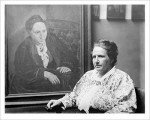Alphabet
When I was four years old, my father (Morris Persky) bought a blackboard on an easel for me. Across the top of the blackboard, the alphabet was printed in white letters. My father’s method of instruction was to draw pictures I requested–a cowboy, say–and then to write the word on the blackboard, pointing out how the letters of the word related to the alphabet at the top of the board.
Once I’d mastered the basics, he drew me complicitously into a routine in which I demonstrated my rudimentary spelling ability to unsuspecting relatives. At a family gathering, he would show me off by innocently asking, “Now, can you spell ‘cat’?”
“C-a-t,” I replied.
“How about ‘bat’?”
“B-a-t,” I dutifully answered, to the silent chorus of adults nodding approval.
“Spell ‘rat’,” he commanded.
“R-a-t.”
Then–just as boredom was about to set in among our familial audience–along came the punchline. “Spell ‘idiosyncrasy’,” my father said in a deadpan voice.
“I-d-i-o-s-y-n-c-r-a-s-y,” I rattled off. My first parlour trick.
Now, much later, I’m tempted beyond the confines of the 26 letters of the English alphabet. I’m attracted to letters found in other languages: the “n” with the tilda over it in Spanish that gives us “nino” and “senor,” or the double “ll” for “llama” and “Mario Vargas Llosa.” Also, the small diagonal slash across the letter “l” in Polish, pronounced as a “w,” as in the name of the Polish labour leader, Lech Walesa, so that his last name is pronounced “Va-wen-sa” (the “n” sound comes from a cedilla under the “e”). I’m equally fond of the German double “s” in “Strasse,” which has its own sign, and the tongue-twisting “Schlossstrasse” (Castle Street) two streets over from where I live in Berlin. Finally, there are the various diacritical marks that can be placed above the letter “s” in Slavic languages to produce a “sh” sound, as in my childhood Polish nickname, “Stas.”
Beyond that, other orthographies: Arabic, Cyrillic, Hebrew, Greek. I’ve always wondered why there’s no equivalent in English to Greek’s sensible “theta” for the “th” sound. I guess it’s just a matter of linguistic, um, idiosyncrasy. I suppose I should be grateful that my ABC’s are not predicated on the thousands of characters in Chinese–then there would truly be no end.
386 w. posted July 30th, 2001


